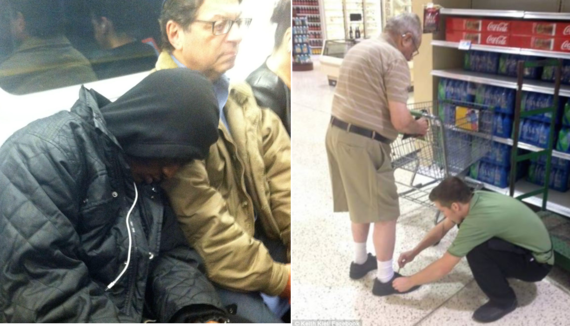Above are two of my favorite viral photos. The one on the left is of Isaac Theil allowing college student Garvey Dutes to sleep on his shoulder in a New York subway car. The one on the right is of Gage Boucher, a grocery store employee, tying the shoes of an elderly customer. What I love about these photos is that they represent small gestures between strangers -- and the power of these images resonated with tens of thousands of people.
Life. Stuck in traffic. Waiting in line. Being snubbed by a waiter. Relatives criticizing your parenting. Friends questioning your choice of partner. Your partner arguing about vacation plans. Concerned about how to pay your bills. Dealing with an unwanted diagnosis. Grappling with emotional leftovers from childhood. Anxious about getting a job. Worried about your children's future. Stressed about making a deadline at work. As undesirable as these situations are, they are also opportunities to practice kindness and gratitude. Responding kindly and gratefully will not necessarily make these situations go away, but it can help you be more resilient, more flexible, happier, and healthier as you cope with them.
As someone who travels as part of my work, I find that when I practice looking for opportunities to be kind and grateful in the airport, on the airplane, at the rental car counter, and in the hotel, travel is a much more enjoyable experience. Further, when I practice looking for the ways others are being kind and grateful, everyday becomes an opportunity to fall a bit more in love with humanity. Of course, I always have the option of practicing resentment about delays, the lack of legroom, and the price of unsatisfying airplane snacks. But when I choose this route, I feel crummy and I get the added bonus of dumping my energy into something I cannot control.
The body of research on the mental and physical benefits of kindness and gratitude is impressive. Not only do they feel good, these two simple practices can help protect and boost your immune system, reduce stress and anxiety, buffer against depression, strengthen self-control, and support healthy proactive behaviors such as exercise, eating well, and getting regular check-ups. People who regularly practice being kind and grateful are also less likely to procrastinate, more likely to remain focused on priorities, find a creative solution to a problem, and view the future positively. Further, research indicates that the benefits are reciprocal. The person who is giving, the person who is receiving, and remarkably, the people who are witnessing, all benefit from expressions of kindness and gratitude.
Kindness is not the same as being nice. Kindness is an action that is motivated by empathy and compassion -- a sense of understanding and connection. We can be nice to others without the internal experience of genuinely hoping for their wellbeing. In fact, we can be nice out of habit without considering the other person at all. Acts of true kindness are done out of a desire for the other to benefit. The point is not to get something. Giving to get is not kindness; it is manipulation.
Gratitude is more than the expression of thanks. It is the felt experience of genuine appreciation. You can practice being grateful for an action or gesture, for the presence of someone in your life, or for the mere fact of your existence. In fact, you do not need a reason to be grateful. A powerful practice when you wake up in the morning or when you are going to bed at night is to connect with the experience of gratitude for the day. Standing or sitting upright, taking a deep gentle breath, allowing yourself to smile lightly, and saying thank you as you create openness across your chest and shoulders -- this simple practice done regularly can change both your physiology and your outlook. A friend of mine once told me, "Gratitude is a bulky emotion -- it doesn't leave room for much else."
The biggest challenge to all of this is that your brain will give you lots of compelling reasons why you should resent, resist, and complain about circumstances and people you do not like. Being kind and grateful is not a replacement for addressing injustice, asserting values, working toward important goals, or dealing with challenge. Practicing kindness and gratitude is a way to positively impact the quality of your experience and relationships while you are doing these things. Despite what your brain may tell you, your capacity for being kind and grateful is not dependent upon either your circumstances or how you feel. Put simply, kindness and gratitude are available to you whenever you choose to practice them.
A reality of being human is that, between your birth and your death, many things will happen. You will experience some of these things as pleasant and comfortable and others as difficult and unwanted. You do not have control over the circumstances that life presents, but you do have a choice about how you respond to them. Responding to whatever shows up with kindness and gratitude is a powerful choice. It is a choice that is supported by hundreds of scientific research studies. It is a choice that has been recommended in every enduring wisdom tradition for thousands of years. What will you choose?
Want to read more about the benefits of gratitude and kindness? Check out these books:
Why Good Things Happen to Good People by Stephen Post
The Healing Power of Doing Good by Allan Luks
Positivity by Barbara Fredrickson
The How of Happiness by Sonja Lyubomirsky
Thanks by Robert Emmons
Dave Mochel, CEO of Applied Attention, teaches individuals, teams, and organizations how to optimize the human brain for performance and well-being. The research-supported practices he teaches lead to personal fulfillment and health, strength of personal relationships and organizational cultures, overall productivity, and effectiveness in leadership. Dave teaches one on one, on site, remotely, and in retreats and seminars. You can contact him at dave@appliedattention.com
